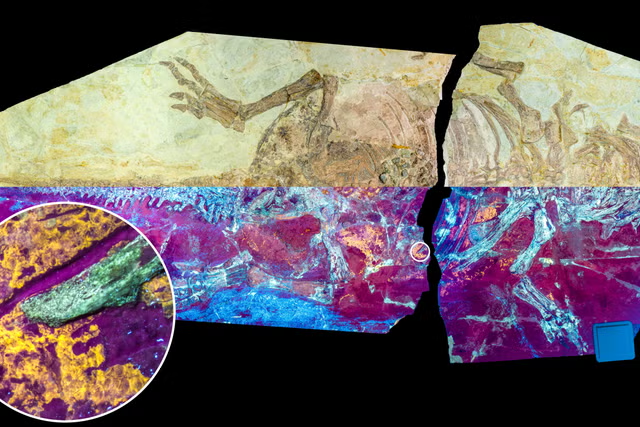Severe sickness during pregnancy can be life-threatening for both mother and child, but women are often told it is all "in their heads," said geneticist Marlena Fejzo, who is on a mission to dispel these myths and misconceptions to better support millions of pregnant people and even save lives.
Nausea and vomiting affect about 70 percent of pregnant people from as early as four weeks into pregnancy. In about 1 to 2 percent of women, this nausea and vomiting is so excessive and persistent that hospitalization is required. This severe end of the spectrum is known as hyperemesis gravidarum, and without appropriate treatment, HG can be fatal.
In December, Fejzo—an assistant professor in genetic epidemiology at the University of Southern California's Keck School of Medicine—and her colleagues made a major discovery into the underlying cause of HG: a hormone called growth differentiation factor 15, or GDF15. Today, in a peer-reviewed opinion article in the journal Trends in Molecular Medicine, Fejzo debunked three of the most common (and potentially dangerous) myths surrounding HG and so-called morning sickness.
"The myths have led to limited progress on HG, undertreatment, and even mistreatment that has contributed to more suffering and poor maternal, fetal, and child outcomes," Fejzo told Newsweek.
Myth 1: Severe Morning Sickness Is Harmless and Normal
Pregnant people with HG are basically starving, Fejzo said, which can lead to serious long- and short-term health implications for both the parent and child. For example, HG is a top predictor for postnatal depression, 26 percent of pregnant people with HG report suicidal ideation, and 18 percent meet the full criteria for post-traumatic stress disorder.
In extreme cases, HG can cause a life-threatening swelling of the brain due to a vitamin B1 deficiency.
For the child, HG has been linked to preterm births, low birth weights and neurological problems later in life.
"It really is ... a factor which interferes with normal fetal development, but it's still not taken seriously by a lot of medical professionals," Fejzo said. "A lot of people are brushed off and told, 'Oh, that's normal. It's okay, just don't take your prenatal vitamins; you don't need them.'
"If people continue to believe that HG is not associated with poor outcomes, despite strong evidence to the contrary, then they will continue to take it less seriously."
Myth 2: Morning Sickness Is Psychosomatic or Caused by the Hormone Detected in Pregnancy Tests
For years, it was thought that morning sickness was caused by human chorionic gonadotropin, or hCG, the hormone detected in pregnancy tests. Fejzo and her colleagues recently found that another hormone, GDF15, was the more likely culprit.
GDF15 is a component of a normal stress response. However, in their study, the team found that individuals who suffer from HG often have lower levels of GDF15 circulating in their blood prior to pregnancy. This makes them extra sensitive to the GDF15 produced by the growing placenta.
These findings have significant implications for people suffering with HG. "GDF15 may be safe to manipulate in pregnancy or even prior to pregnancy," Fejzo said. "If we can increase levels of GDF15 before someone becomes pregnant, that might desensitize them, similar to how we try to desensitize people to allergens who have severe allergies. And during pregnancy, we may be able to minimize or get rid of symptoms by blocking GDF15 or its receptors in the brain stem."
Fejzo warns that if people continue to believe that hCG is responsible for these symptoms—or, worse still, that they are psychosomatic—women will miss out on these potentially life-changing treatments.
"If people continue to believe it is caused by hCG or psychosomatic then researchers will continue to waste time and resources on measuring hCG levels and psychological factors rather than switching gears and moving forward with the unrefutable evidence that the nausea and vomiting hormone GDF15 is strongly associated with HG," Fejzo said.
Myth 3: Only Humans Experience Morning Sickness
Nausea and appetite loss during pregnancy are not uniquely human traits. In fact, these symptoms have been observed in monkeys, cats, dogs and chickens, among other animals. So there may be some evolutionary advantage to morning sickness.
"This condition likely evolved because it was probably beneficial to avoid going out searching for food during pregnancy," Fejzo said. "That may still be true for animals, but people don't need this anymore, so let's end the suffering once and for all if we can.
"If people continue to believe the myth that the condition only occurs in humans, they may continue to blame women rather than realizing this is a biological behavior that likely gave us a survival advantage when scavenging for food was fraught with dangers, but it is something humans no longer need."
Fejzo added: "I always think it's interesting that the recommendation for cats is that if they're unable to eat for a day, you should contact your veterinarian, but we don't have that recommendation out there for women with hyperemesis. If you call your doctor's office and say you haven't eaten for a day, they'll say, 'That's normal,' and won't do anything. There's more proactive care for cats than humans."
So why have these myths persisted for so long? And why are we only now finding out what causes this life-threatening condition?
"In general, because women's issues tend to be belittled or ignored and because it is at the end of the spectrum of a common condition, morning sickness, it is just thought that it is something you just have to live with," Fejzo said. "But for the severe form [HG], which can be life-threatening, it has been very difficult to move the research forward."
Fejzo mentioned obstacles that have contributed to the lack of progress in HG research:
- "The thalidomide disaster, where babies were born with limb deformities to moms that took medication to treat [HG] stopped pharmaceutical companies from researching it, and scared doctors and patients from prescribing and taking medications in pregnancy, so there was very little interest or financial backing for research.
- "The misguided belief that the severe form, HG, is psychological in nature.
- "The incorrect belief that the severe form, HG, is self-limiting. It is now known to be associated with both maternal and child adverse outcomes.
- "Obstetricians are generally not trained to ask their patients about their levels of nausea and vomiting, and patients may not talk about it either, so the severe form may be underdiagnosed."
Fejzo said she had a personal experience of HG, which inspired her to uncover the biochemical underpinnings of the condition.
"I lost a baby in the second trimester to very severe HG," she said. "My doctor thought I just wanted attention even though I was unable to eat, drink, or move without violently vomiting for weeks. I was determined to find the cause so that in the future other people, including my own daughters, would not have to go through what I did."
Despite her successes in the field, Fejzo said it was still difficult to get funding to continue her research at the University of Southern California. "But I am very excited to report that I am working with a company, Harmonia Healthcare, and we just opened our first HG treatment center in New Jersey, with more to follow, that I think will change the way people with HG are treated," she said. "We are making progress despite the myths."
You can find the full opinion piece in the journal Trends in Molecular Medicine.
Disclaimer: The copyright of this article belongs to the original author. Reposting this article is solely for the purpose of information dissemination and does not constitute any investment advice. If there is any infringement, please contact us immediately. We will make corrections or deletions as necessary. Thank you.



